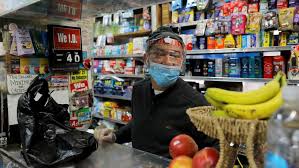~ by Melissa Cedillo, National Catholic Reporter
Early on in the pandemic, Monica Ruiz-Caraballo of Casa San Jose in Pittsburgh knew responding to COVID-19 was going to look different for her community.
 “We work with primarily undocumented people who do not qualify for a stimulus check or unemployment benefits,” she explained during a July 14 webinar hosted by the Center for Migration Studies of New York, a non-profit that studies domestic and international immigration issues.
“We work with primarily undocumented people who do not qualify for a stimulus check or unemployment benefits,” she explained during a July 14 webinar hosted by the Center for Migration Studies of New York, a non-profit that studies domestic and international immigration issues.
The webinar focused on how Catholic organizations serving immigrant communities in the U.S. adapted during Donald Trump’s administration and the beginning of the pandemic.
The report found that immigrant communities faced difficulties in accessing online services during lockdown periods due to poor internet connection, limited computer access and a lack of communications technology and training.
Alfonso Lara, Director of Centro San Juan Diego of the Denver Archdiocese noted that much of the country’s essential workforce relies on labor from immigrant communities.
“Many of our people are construction workers or domestic workers. They could not stay home or help their kids figure out how to use technology,” said Lara.
The migration center report found that Catholic organizations across the country set up resources to mitigate the blow of the pandemic for immigrant communities, but a looming fear of the previous administration’s immigration enforcement policies prevented immigrants from accessing those services.
During the webinar, a new challenge for immigrant and refugee communities was address: vaccines. Lara said that a lot of people in the Spanish speaking community do not want to get the vaccine because some immigrants believe they can get deported for getting the vaccine which she attributes to misinformation about who is eligible to receive it. To read the full article please click here
